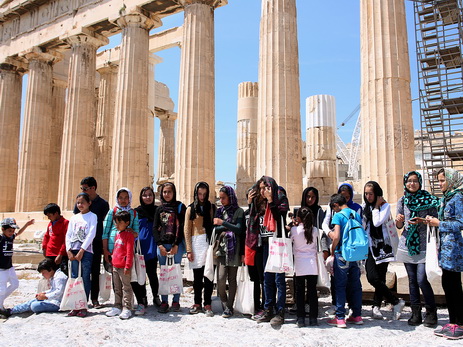Addressing the refugee crisis requires a comprehensive approach to security – New Europe

In October 1943, some 7,220 of Denmark’s 7,800 Jews were evacuated by the Danish resistance movement to Sweden to escape the Nazi concentration camps.
They arrived by sea to the safety of Swedish shores, where they enjoyed the security of living in a neutral country, an act of solidarity that likely saved the lives of over 99% of Denmark’s Jewish population.
Seven decades later, Sweden has become home to tens of thousands of Syrian refugees fleeing a terrible conflict that is now more than five years old, earning our nation a reputation once again as a welcoming haven on a continent that has generally been less than welcoming when it comes to migrants and refugees. Yet, we are also struggling with fundamental questions of integration and Swedish identity. Our policies of openness have led to backlash and division, spurring controversy that threatens to undermine our values of liberalism and tolerance.
But as important as these fundamental questions are, there is a point that too often is forgotten when it comes to discussions on the global migration crisis. While much attention is paid to the way that the influx of refugees and migrants is being handled by European leaders, surprisingly little attention is paid to the underlying question of why these people are fleeing their homes in the first place, and more specifically to the imperative of conflict resolution.
The Organization for Security and Co-operation in Europe, where I serve in the Parliamentary Assembly’s Committee on Political Affairs and Security, has long advocated what it calls “a comprehensive approach to security” that encompasses politico-military, economic and environmental, and human aspects. This approach includes an immediate effort at conflict mediation and a more long-term effort to address the root causes of migration and other issues.
Comprehensive security has never been more needed than it is today. The cascading effects of political instability, poverty, environmental degradation, and lack of respect for human rights have given rise to both increased migration and growing trends of violent extremism and radicalization. Efforts to improve “migration management” will only be a stopgap solution if other underlying issues are not effectively addressed.
As we have tragically seen in recent months, the terrorist threat is on the rise in Europe, leading to the unfortunate side effect of politicizing the migration crisis and in some cases scapegoating desperate people – men, women and children – who are fleeing war and repression. While acknowledging the core humanitarian concerns of the crisis, it is important that we also address its root causes, with a particular focus on conflict resolution in countries of origin.
The immediate and most urgent concern is resolution of the Syrian conflict, as this is the primary source of refugees making the dangerous journey for a better life in Europe. Although efforts continue to resolve the conflict diplomatically, these efforts are undermined by the fact that arms transfers continue to supply all sides of the conflict with powerful advanced weapons. There is little chance for peace when the belligerents know that they can continue to expect the unwavering support of their foreign backers.
An arms embargo respected by all foreign powers and groups would go a long way in advancing the cause of diplomacy, and indeed, it is irresponsible for governments to continue giving military support to the warring parties in a conflict that is largely responsible for a refugee crisis destabilizing, to varying degrees, all of Europe.
But while much of our attention is now on Syria, we should not forget other conflicts in the region that are also a source of migration. Among the most pressing issues include the conflicts and political instability in Libya, Yemen, Iraq and Afghanistan.
Closer to home, we have a crisis in and around Ukraine – spurred by Russian aggression – that has claimed the lives of some 10,000 people and led to the internal displacement of 1,382,000, plus nearly a million refugees living in neighboring countries. There is also a protracted conflict in Moldova, which shares a border with Ukraine. While the ceasefire in the Moldova’s Transnistria conflict has largely been respected since 1992, the same cannot be said of the protracted conflict between Azerbaijan and Armenia over Nagorno-Karabakh.
The recent military escalation in the Nagorno-Karabakh zone of conflict demonstrates that these so-called “frozen” conflicts are anything but frozen and can boil over into hostilities at any time. Our emphasis must be on all sides of the Nagorno-Karabakh dispute and indeed all other conflicts in Europe’s immediate neighborhood to rapidly return to the political process.
The OSCE Parliamentary Assembly and the committee in which I serve as rapporteur will be addressing these issues and more at our upcoming Annual Session, being held this year in Tbilisi, Georgia, which is home to its own protracted conflicts and refugee issues. With the breakaway regions of South Ossetia and Abkhazia – again, backed by Russia – undermining Georgia’s territorial integrity and sovereignty for more than two decades, participants at our Annual Session will be grappling with local issues that have repercussions throughout Europe and beyond.
The dedication and sense of urgency that we bring to conflict resolution efforts in Tbilisi will hopefully resonate elsewhere in the region, serving as an example and providing impetus to the comprehensive approach to security that the OSCE has pioneered. As we see in Sweden and across the European continent, this approach is in dire need of revival, for only when it is implemented in full can we hope to see the stabilization needed to ensure peace, prosperity and human security for all.
Margareta Cederfelt is a Member of the Swedish Parliament representing the Stockholm constituency. She serves as rapporteur of the OSCE Parliamentary Assembly’s Committee on Political Affairs and Security.














